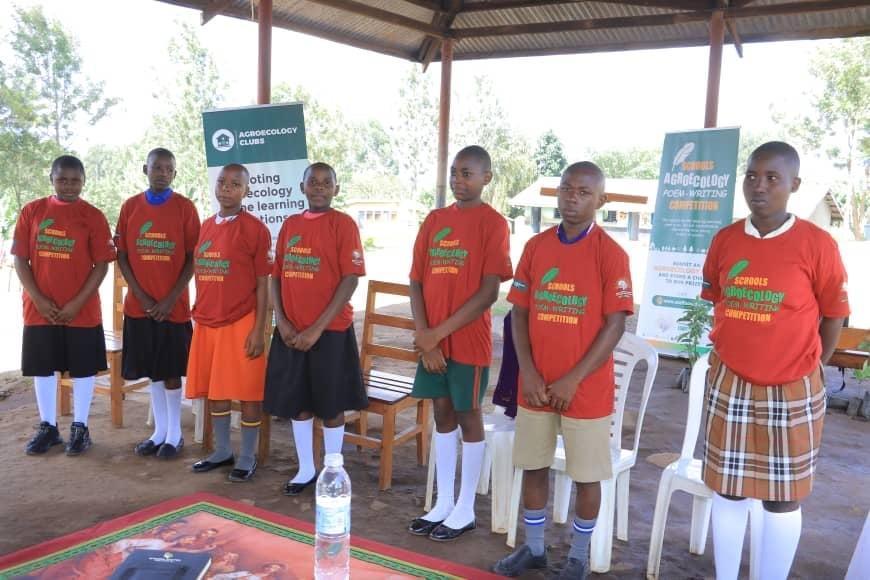Africa-Press – Uganda. As the world battles the crises of climate change, and conventional food systems, Uganda’s learners are preparing to raise their voices in a powerful way, through poetry.
On September 19, 2025, Eastern and Southern Africa Small-Scale Farmers’ Forum (ESAFF Uganda) in collaboration with partners will host the National finals of the 3rd Edition of the Schools’ Agroecology Poem Writing Competition at Namugongo Kyoto, (Les Foyers de Charite) Kampala.
The competition, now in its third year, has become more than just a literary exercise.
It is an arena where learners transform their reflections on climate justice, food security, and the environment into compelling verses that echo across classrooms, communities, and policy spaces.
This year’s contest will be graced by Dr. Grace Baguma, the Executive Director of National Curriculum Development Centre (NCDC) under the theme “Embracing Agroecology for Healthy Communities.”
It calls upon learners to interrogate the practices that determine how food is grown, distributed, and consumed.
In doing so, it is quietly cultivating a new generation that is not afraid to challenge the status quo of chemical-dependent farming, land degradation, and exploitative trade systems.
The journey to the national finals has been rigorous. The competition began with school-level contests, where learners tested their writing and innovation skills against their peers.
From these, the strongest voices advanced to district competitions, and later to regional contests that brought together some of the brightest young talents in the country.
At each stage, students were given an opportunity to improve their submission as they faced competitors from different spheres, encouraging students to deepen their knowledge and sharpen their perspectives.
By the time the finalists gather in September, they will represent not just themselves or their schools but the collective aspirations of Uganda’s youth.
Their performances will embody a country’s hope that its next leaders will be environmentally conscious, socially responsible, and unyielding in their pursuit of food sovereignty.
Dr Grace Baguma, in an interview, hailed this initiative, highlighting that it is one way to motivate learners to develop a passion for agriculture, chiefly agroecology and the importance of conserving Africa’s natural ecosystems, in line with Uganda’s Competency based curriculum.
She stated, “In fact, it is one way of encouraging learners to become more interested in agriculture, particularly organic agriculture, as many students and pupils are often disinterested, especially since they are sometimes subjected to punishments such as working in gardens for wrongdoings”
Since 2023, ESAFF Uganda has sought to ensure that learners do not remain passive recipients of knowledge but active participants in shaping the national conversation on agroecology and Agriculture at large through poetry.
Nancy Mugimba, the National Coordinator for ESAFF Uganda says learners are powerful agents of change capable of shaping the future through their voices and creativity.
“As the world grapples with rising non-communicable diseases linked to conventional farming, soil depletion, and the impacts of climate change, our learners emerge as powerful messengers of change.
Their poems and articles have the ability to inspire communities, influence leaders, and remind us of the urgent need to embrace agroecology for healthier, more resilient societies,” She said.
In an interview, Achilles Byaruhanga, the Executive Director of Nature Uganda and recipient of the Prince William Award for Conservation in Africa, emphasized that teaching young people about climate change and involving them in campaigns for sustainable food systems is an effort that should have started many years ago, given the precarious state of the country’s food systems, which face the threat of imminent collapse due to unsustainable methods of food production.
“By giving students, a platform to express their understanding and advocate for agroecology, the initiative not only educates the next generation about sustainable practices but also empowers them to become active agents of change.
At a time when urgent solutions are needed, nurturing young leaders who can influence communities, inspire policy, and champion resilient food systems is both strategic and essential,” he said.
Adrine Atwiine, the Monitoring, Evaluation, Accountability, and Learning (MEAL) Officer for ESAFF Uganda, elucidated that the initiative is a powerful tool to nurture young advocates who not only understand agroecology in theory but also apply it practically to advance sustainable food systems.
She highlighted that the competition provides learners with a platform to connect their creative expression to real-world environmental and agricultural practices, thereby reinforcing knowledge with action.
“Through the Schools’ Agroecology Poem Writing Competition, the past winners and participants in the competition were able to practice what they have written in their poems.
In schools, learners have used the knowledge acquired to establish Agroecology Club projects including poultry, production and use of organic pesticides and fertilizers and establishment of agroecology gardens.
In farming communities, learners have adopted these practices on their farms together with their parents. They are planting trees and reusing plastic bottles and containers to conserve the environment,” She asserted.
Excellent performers will be awarded with prizes, designed to reward creativity, but also to demonstrate that investing in the intellectual and moral growth of young people is investing in the future of Uganda’s food systems.
The competition is nurturing future advocates, policymakers, and leaders as they are equipped not just with literary skill, but with a consciousness that will allow them to stand at the forefront of movements against climate change and ecological destruction.
For More News And Analysis About Uganda Follow Africa-Press






